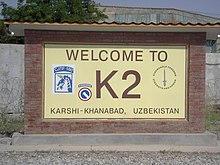
Sens. Dianne Feinstein (D-CA), Marsha Blackburn (R-TN), and Tammy Baldwin (D-WI) introduced a bill designed to help veterans who served at Karshi Khanabad (K2) Airbase in Uzbekistan to obtain the health screenings and services they need.
According to a U.S. Army study conducted in 2015, service members who were deployed to K2 are more than five times as likely to develop cancer than those who deployed to South Korea. Servicemembers who were stationed at K2 were exposed to a number of chemical and radiological hazards, including depleted uranium, chemical weapons, fuels, and solvents.
Since the study, the estimated number of veterans who have cancer and other severe medical conditions has increased. Due to a lack of recognition, the senators said there are no dedicated resources available to K2 veterans, which prevents them from receiving the necessary care and benefits they need.
“Elevated levels of cancer and other diseases have been discovered among veterans who served at Karshi Khanabad Air Base in Uzbekistan,” Feinstein said. “Any potential exposure our service members had to hazardous material must be investigated, and related health issues should be covered. I’m proud to support Senator Blackburn’s bill that will study the source of these health issues and get veterans the care they deserve.”
The K2 Veterans Toxic Exposure Accountability Act requires the Department of Defense to conduct an epidemiological study; create eligibility for K2 vets to be included in the Department of Veterans’ Affairs’ Burn Pits Registry and depleted uranium medical follow-up programs at DoD & VA; and give access to National Academies of Sciences, Engineering, and Medicine (NASEM) to studies conducted by VA and DoD.
“Veterans of the Fort Campbell-based 5th Special Forces Group and 160th Special Operations Aviation Regiment groups were deployed to K2 from 2001-2005,” Blackburn said. “Since then, they’ve faced unique health challenges that have been overlooked for far too long. This bill is a necessary first step in recognizing the long-term health effects from these dangerous exposures that will give K2 Veterans access to much-needed care.”
Baldwin said this legislation lays the groundwork for ensuring that servicemembers who were deployed to K2 in Uzbekistan are covered and compensated for exposure to toxic substances at the base.
“The VA should avoid repeating past mistakes like it did with Agent Orange exposure for Vietnam veterans, and quickly move forward with recognition and coverage for any diseases associated with exposure to toxic substances such as depleted Uranium or particulate matter from military burn pits,” Baldwin said.




